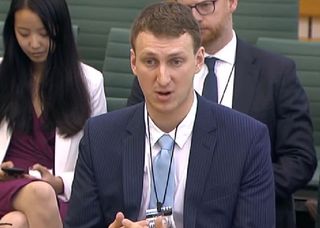Aleksandr Kogan Says Facebook Singled Him Out While Hiring His Partner After 'ToS Abuse'

Aleksandr Kogan testified in front of a UK Parliamentary committee arguing that Facebook is feigning outrage over the user data harvesting done by his company Global Science Research (GSR) and Cambridge Analytica, while singling him out but hiring his former GSR partner.
Kogan also implied that Facebook may have allowed third-party developers to do more with user data through the APIs than what the Terms of Service (ToS) technically allowed.
Aleksandr Kogan’s Testimony
Kogan said he began collaborating with Facebook in 2013 while he was working for the University of Cambridge. Facebook provided him with country-level data sets on friendship connections and emotions.
During this collaboration, Kogan also wrote a survey app called “CPW Lab App” that collected information from both the users that installed the app as well as their friends, including demographic information and “liked” Facebook pages.
Kogan also admitted that for a few studies he used private messages data, but that he “made it explicitly clear” in the consent form that this data will be collected. He said he obtained the data of up to 2,000 participants, but not the data from their friends.
All of this data was stored at the University of Cambridge and was never shared with Cambridge Analytica and the SCL Group.
Kogan started working with the SCL Elections and its American division, Cambridge Analytica, in 2014. Kogan and his partner from GSR, Joseph Chancellor, renamed the CPW Lab App to GSR App and started creating personality profiles of American citizens from 11 states for SCL. Eventually, SCL wanted data on citizens from all 50 states and it also wanted data on people who have liked pages of political figures and celebrities.
Stay on the Cutting Edge
Join the experts who read Tom's Hardware for the inside track on enthusiast PC tech news — and have for over 25 years. We'll send breaking news and in-depth reviews of CPUs, GPUs, AI, maker hardware and more straight to your inbox.
Facebook Hired Kogan’s Partner After GSR’s ToS “Abuse”
Although Facebook seemed outraged that SCL Elections, Cambridge Analytica, and Kogan’s company GSR abused its policies, when it learned about this supposed abuse, one of its reactions was to hire Kogan’s partner, Chancellor, who is still working for Facebook right now. However, when the Cambridge Analytica scandal broke out, Facebook seemed to single-out Kogan as the only person responsible for the ToS abuse from the GSR company.
When Kogan was asked by UK MPs whether or not he broke Facebook’s ToS, he said that he (and his company) may have technically broken the legal limits set by Facebook’s ToS. However, he implied that Facebook itself wasn’t actually living by those rules either. It’s possible he was referring to the fact that Facebook’s APIs allowed third-party developers to do more with the data than what the policies allowed.
Kogan also refuted comments from former Cambridge Analytica CEO, Alexander Nix, saying that Cambridge Analytica never received any data from GSR.
Facebook In “PR Crisis Mode”
In the Parliamentary hearing, Kogan told the committee that Facebook is scrambling to blame others after the Cambridge Analytica scandal broke out, because it knows that the abuse by Cambridge Analytica and potentially many others is due to its platforms’ lax rules:
I think they realize that their platform has been mined left and right by thousands of others and I was just the unlucky person that ended up somehow linked to the Trump campaign, and we are where we are.I think they realize all this, but PR is PR and they’re trying to manage the crisis, and it’s convenient to point the finger at a single entity and try to paint the picture this is a rogue agent.
In the recent U.S. Congressional hearings, Facebook CEO Mark Zuckerberg said that the scandal hasn’t affected the company much. However, Zuckerberg may have been downplaying the damage.
In a survey done by Team Blind, a company that builds an app that allows company workers to chat anonymously with each other, almost 14% of Facebook users said they deleted their accounts, while 23.6% of the respondents said that they tightened their privacy settings in Facebook. Almost 10% of the respondents also said that they didn’t have a Facebook account before the incident.
The true impact of the Cambridge Analytica scandal will likely be seen over the next year or two, because now the scandal is on everyone’s minds. By itself this may result in lower engagement on Facebook in the future, as people try to be more cautious about what they reveal on the platform. Users may also take additional steps to protect themselves against Facebook’s shadow tracking, too.
-
shrapnel_indie It wouldn't surprise me in the slightest if Kogan became the sacrificial lamb to cover the sins of FB.Reply -
therealduckofdeath He just can't stop the whataboutism, can he? Yes, CA is being singled out today. They're being singled out because of the way they abused data to create narratives with extreme lies tailored to have the best effect on individuals without ever disclosing the reason for the spam.Reply
I expect all other organisations who's worked like CA will be investigated, too. Be they left, center or right. I just don't feel pity for a guy using whataboutism as a defence. Imagine a serial killer trying that... ?? -
ubercake I can't see anyone really getting in trouble for any of this, but it gives some members of congress and the senate an amusing diversion from the usual mumbo jumbo.Reply
If nothing else, this whole experience will bring government and Zuckerberg closer together by creating lasting business/monetary relationships between them.
Most Popular







